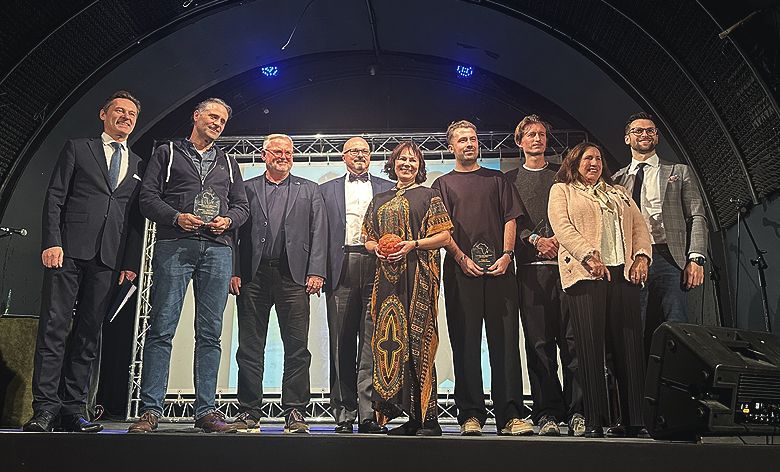H. Prize for Young African Entrepreneurs: Kenyans Ngotiek Benson and Emily Bakhitah win the second edition
Strengthening female entrepreneurship in the Nyanza region, through a subsidised credit system, and setting up a self-sufficient hydroponic farm in Sekenani: these are the objectives of the two projects that Harambee will support, in Kenya, in the framework of the 2nd edition of the 'Young African Entrepreneurs Award'. The presentation of the winners took place in Rome, on 30 September 2022, as part of the Association's 20th anniversary celebrations.
Harambee has established partnerships with a number of business incubators linked to prestigious universities in Nigeria, Kenya, Côte d'Ivoire and South Africa; their added value lies in the objective they pursue: to train young entrepreneurs with a strong social impact who are able, that is, to create innovative, competitive but also sustainable businesses for Africa and the world.
"With the desire to support the work that these institutions carry out, we have therefore launched a competition aimed at supporting, through a selection process, young local entrepreneurs interested in starting new economic initiatives that allow the generation of income and work, with a focus on sustainability”.
Africa is the continent with the highest rate of entrepreneurship in the world and the largest laboratory of experimentation where start-ups are born, evolve and offer concreteness to ideas and innovation, generating jobs, albeit in sometimes fragile contexts.
"In the last fifteen years we are seeing an interesting dynamic among young people who are no longer necessarily looking for a job, but aspire to take the path of entrepreneurship," explains Vincent Ogutu, Vice-Chancellor of Strathmore University. "Africa is the only continent that is still growing in population and whose youth represent a huge percentage. If the trend of young Africans going into entrepreneurship continues to increase, this combination of growing population and entrepreneurship is potentially one of the most powerful competitive advantages the continent could benefit from."
But for this growing wave of entrepreneurship to take hold, it is necessary to invest in learning and capacity-building opportunities. Indeed, the lack of adequate training is the main obstacle and the area where collaboration is needed.
Selected projects
The Sekenani hydroponics project
The initiative aims to establish a self-sustainable hydroponic farm in the Sekenani area that will not only produce enough food for sale in local villages and hotels, but also create employment and learning opportunities for young people in the local community.
Sekenani is a rural town on the edge of the Masai Mara National Reserve. The village relies on tourism and pastoralism as its main economic activities, but there is a need to create alternatives considering the difficulties experienced by both sectors, as well as the high levels of youth unemployment present. Tourism is a seasonal activity and mainly benefits the hospitality industry rather than the local community, while pastoralism is severely challenged by climate change, particularly drought. In the face of these problems, there are good opportunities for agricultural enterprises, considering the local market created by hotels, lodges, campsites and the community itself. The produce consumed in and around Sekenani comes from afar and is therefore very often not fresh, and prices are too high to cover transport costs.
The hydroponic farm aims to meet this challenge by producing locally. A large number of young graduates who are out of work return to Sekenani. They have the ability to learn, but lack the opportunity to apply their knowledge and skills. The farm will therefore offer training and employment to these young people.
The enterprise will be run by a select group of graduates coordinated by Ngotiek Benson, as part of the Sekenani envirotech hub supported by Strathmore Business School.
"The solution for Africa is not aid, because in the long run it has caused more harm than good," argues Benson "It is rather to create an enabling environment for social entrepreneurship. It is businesses that can create solutions to existing problems. Problems are opportunities to innovate and grow rapidly”.
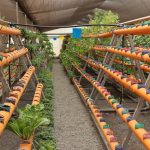
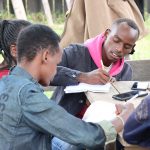
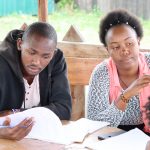 The microfinance project for women entrepreneurs
The proposal aims to provide a small-scale loan scheme (at a subsidised rate of 2% instead of the current rate of 12%) to young mothers, under a programme run by Rise and Shine Education Foundation, to start or strengthen their small businesses in the Nyanza area, Kenya.
Women micro-entrepreneurs are an integral part of Kenya's rural economy. The livelihood of rural households depends mainly on the income of small businesses run by women, but they face numerous problems due to difficulties in accessing capital and adequate training for business and financial management. These barriers limit the growth of their businesses and thus threaten household livelihoods. Existing financing options are based on mobile phone loans that charge very high interest rates that small women entrepreneurs cannot afford. The microfinance project will act as a form of empowerment on several levels: better standard of living for participating families; possibility to make strategic life choices; increased bargaining capacity, reduction of gender-based violence and more influence in family decision-making; better approach towards child development: profits are, in fact, largely used for children's education, family health care and emergency management.
The project will be managed by Emily Bakhitah Akoth, who has experience in the financial sector and is committed to youth empowerment through the Rise and Shine Education Foundation she co-founded.
"Women are the primary contributors to the socio-economic development of the country and therefore, in order to improve the socio-economic conditions of people in any country, it is important to empower them," says Emily.
Both projects will be supported by Strathmore Business School to whom the allocated grants will be transferred and who will accompany the group of entrepreneurs in starting these initiatives.
The microfinance project for women entrepreneurs
The proposal aims to provide a small-scale loan scheme (at a subsidised rate of 2% instead of the current rate of 12%) to young mothers, under a programme run by Rise and Shine Education Foundation, to start or strengthen their small businesses in the Nyanza area, Kenya.
Women micro-entrepreneurs are an integral part of Kenya's rural economy. The livelihood of rural households depends mainly on the income of small businesses run by women, but they face numerous problems due to difficulties in accessing capital and adequate training for business and financial management. These barriers limit the growth of their businesses and thus threaten household livelihoods. Existing financing options are based on mobile phone loans that charge very high interest rates that small women entrepreneurs cannot afford. The microfinance project will act as a form of empowerment on several levels: better standard of living for participating families; possibility to make strategic life choices; increased bargaining capacity, reduction of gender-based violence and more influence in family decision-making; better approach towards child development: profits are, in fact, largely used for children's education, family health care and emergency management.
The project will be managed by Emily Bakhitah Akoth, who has experience in the financial sector and is committed to youth empowerment through the Rise and Shine Education Foundation she co-founded.
"Women are the primary contributors to the socio-economic development of the country and therefore, in order to improve the socio-economic conditions of people in any country, it is important to empower them," says Emily.
Both projects will be supported by Strathmore Business School to whom the allocated grants will be transferred and who will accompany the group of entrepreneurs in starting these initiatives.

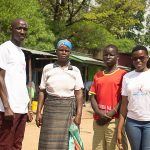
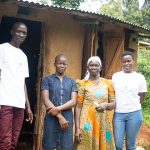 "If we can create ecosystems where entrepreneurs support each other and encourage each other to persevere on this difficult path, we will start to see more and more successful businesses, more and more problems solved, and the new wealth created will provide the foundation for the improvement of other catalyst areas such as education and health," says Ogutu. Africa will therefore be well on its way to solving many of the problems for which it is known.
"In fact, when it comes to aid," adds the Vice-Chancellor, "I think the best use is to partner with some of these entrepreneurs, to contribute the necessary capital, to offer the advice they need to succeed in the venture: in this way, we help them to help themselves."
Read more about the two projects here:
https://www.harambee-africa.org/en/progetti/kenya-microfinance-for-women-entrepreneurs-h-young-african-entrepreneurs-award
https://www.harambee-africa.org/en/progetti/9619
"If we can create ecosystems where entrepreneurs support each other and encourage each other to persevere on this difficult path, we will start to see more and more successful businesses, more and more problems solved, and the new wealth created will provide the foundation for the improvement of other catalyst areas such as education and health," says Ogutu. Africa will therefore be well on its way to solving many of the problems for which it is known.
"In fact, when it comes to aid," adds the Vice-Chancellor, "I think the best use is to partner with some of these entrepreneurs, to contribute the necessary capital, to offer the advice they need to succeed in the venture: in this way, we help them to help themselves."
Read more about the two projects here:
https://www.harambee-africa.org/en/progetti/kenya-microfinance-for-women-entrepreneurs-h-young-african-entrepreneurs-award
https://www.harambee-africa.org/en/progetti/9619


 The microfinance project for women entrepreneurs
The proposal aims to provide a small-scale loan scheme (at a subsidised rate of 2% instead of the current rate of 12%) to young mothers, under a programme run by Rise and Shine Education Foundation, to start or strengthen their small businesses in the Nyanza area, Kenya.
Women micro-entrepreneurs are an integral part of Kenya's rural economy. The livelihood of rural households depends mainly on the income of small businesses run by women, but they face numerous problems due to difficulties in accessing capital and adequate training for business and financial management. These barriers limit the growth of their businesses and thus threaten household livelihoods. Existing financing options are based on mobile phone loans that charge very high interest rates that small women entrepreneurs cannot afford. The microfinance project will act as a form of empowerment on several levels: better standard of living for participating families; possibility to make strategic life choices; increased bargaining capacity, reduction of gender-based violence and more influence in family decision-making; better approach towards child development: profits are, in fact, largely used for children's education, family health care and emergency management.
The project will be managed by Emily Bakhitah Akoth, who has experience in the financial sector and is committed to youth empowerment through the Rise and Shine Education Foundation she co-founded.
"Women are the primary contributors to the socio-economic development of the country and therefore, in order to improve the socio-economic conditions of people in any country, it is important to empower them," says Emily.
Both projects will be supported by Strathmore Business School to whom the allocated grants will be transferred and who will accompany the group of entrepreneurs in starting these initiatives.
The microfinance project for women entrepreneurs
The proposal aims to provide a small-scale loan scheme (at a subsidised rate of 2% instead of the current rate of 12%) to young mothers, under a programme run by Rise and Shine Education Foundation, to start or strengthen their small businesses in the Nyanza area, Kenya.
Women micro-entrepreneurs are an integral part of Kenya's rural economy. The livelihood of rural households depends mainly on the income of small businesses run by women, but they face numerous problems due to difficulties in accessing capital and adequate training for business and financial management. These barriers limit the growth of their businesses and thus threaten household livelihoods. Existing financing options are based on mobile phone loans that charge very high interest rates that small women entrepreneurs cannot afford. The microfinance project will act as a form of empowerment on several levels: better standard of living for participating families; possibility to make strategic life choices; increased bargaining capacity, reduction of gender-based violence and more influence in family decision-making; better approach towards child development: profits are, in fact, largely used for children's education, family health care and emergency management.
The project will be managed by Emily Bakhitah Akoth, who has experience in the financial sector and is committed to youth empowerment through the Rise and Shine Education Foundation she co-founded.
"Women are the primary contributors to the socio-economic development of the country and therefore, in order to improve the socio-economic conditions of people in any country, it is important to empower them," says Emily.
Both projects will be supported by Strathmore Business School to whom the allocated grants will be transferred and who will accompany the group of entrepreneurs in starting these initiatives.


 "If we can create ecosystems where entrepreneurs support each other and encourage each other to persevere on this difficult path, we will start to see more and more successful businesses, more and more problems solved, and the new wealth created will provide the foundation for the improvement of other catalyst areas such as education and health," says Ogutu. Africa will therefore be well on its way to solving many of the problems for which it is known.
"In fact, when it comes to aid," adds the Vice-Chancellor, "I think the best use is to partner with some of these entrepreneurs, to contribute the necessary capital, to offer the advice they need to succeed in the venture: in this way, we help them to help themselves."
Read more about the two projects here:
https://www.harambee-africa.org/en/progetti/kenya-microfinance-for-women-entrepreneurs-h-young-african-entrepreneurs-award
https://www.harambee-africa.org/en/progetti/9619
"If we can create ecosystems where entrepreneurs support each other and encourage each other to persevere on this difficult path, we will start to see more and more successful businesses, more and more problems solved, and the new wealth created will provide the foundation for the improvement of other catalyst areas such as education and health," says Ogutu. Africa will therefore be well on its way to solving many of the problems for which it is known.
"In fact, when it comes to aid," adds the Vice-Chancellor, "I think the best use is to partner with some of these entrepreneurs, to contribute the necessary capital, to offer the advice they need to succeed in the venture: in this way, we help them to help themselves."
Read more about the two projects here:
https://www.harambee-africa.org/en/progetti/kenya-microfinance-for-women-entrepreneurs-h-young-african-entrepreneurs-award
https://www.harambee-africa.org/en/progetti/9619







